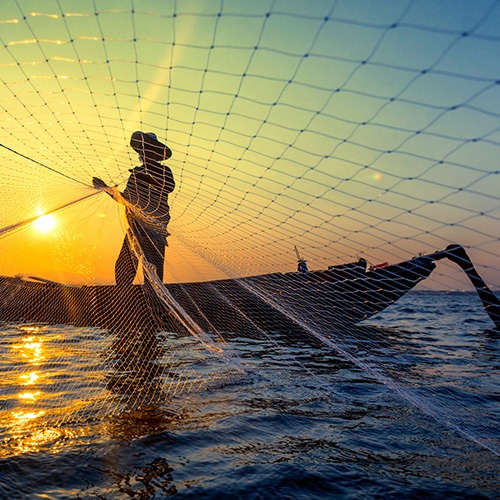We recently caught up with Heather Brayford, Director General of Western Australia’s Department of Primary Industries and Regional Development (DPIRD).
On the coast of Western Australia - home
to the very first MSC-certified fishery in the world, one woman has been
shaping the future of sustainable fisheries and aquaculture for over 35 years.
Meet Heather
Brayford, Western Australia’s Director General of the state’s Department of
Primary Industries and Regional Development (DPIRD). The first woman to lead
DPIRD (an amalgamation of the former Departments of Fisheries, Agriculture, and
Food, and Regional Development), Heather has a strong focus on prioritising biosecurity,
research and development, and sustainability.
Having served the community in the public sector for over three decades, what would you say is one of your proudest moments?
(There are) lots of proud moments. Receiving a Public Service Medal in the Queen’s Birthday honours in 2020 is one of them. The award was a great reflection of the support provided to me over many years by passionate and committed colleagues and industry members who work to ensure Western Australia's fisheries are sustainable and make a great contribution to the State's economy and lifestyle.
Western Australia is a global role model for its journey, leadership and commitment to sustainable fishing showcasing best-in-class collaboration between government and industry. What opportunities and challenges are you facing in achieving long-term sustainability in WA’s fishing industry and are you optimistic these can be addressed?
Climate change is front of mind. Climate variability is impacting our fisheries and we will need to continually monitor and adapt to climate change and build resilience in our fisheries and industries. In addition, the 'spatial squeeze' will continue to present challenges for fisheries as competition for space grows in the marine environment. While this is not an issue that impacts resource sustainability directly, it does impact the viability of fishers and businesses. Our focus will continue to be on long-term sustainability of our aquatic resources and I’m confident that, notwithstanding the challenges, we can continue to be a leading jurisdiction in sustainable fisheries management.
Do you think the governments and business communities around the world see the urgency and are doing enough, fast enough to incentivize sustainable fishing?
We always need to be ahead of the game which is a key part of the Marine Stewardship Council value proposition. There is a a growing trend and community expectation also for safe food which is also responsibly sourced and sustainable. Businesses and regulators will need to respond to this growing market trend.
How do you balance the economic and community interests of the fishing industry with the need to protect marine eco systems?
Sustainable fishing can co-exist with protection of marine ecosystems. Fishers are incentivised to protect ecosystems for the long term. For explicit marine ecosystem protection tools such as marine parks, this is a multi-stakeholder issue, and a well-developed engagement process that seeks to have regard for all values and ultimately achieves an outcome in the best interests of the community is an important part of the process. This can be a tough ask when values, aspirations and interests often differ significantly across various groups and stakeholders.
Do you see promise in what innovative technologies and perhaps even artificial intelligence can offer to the fishing industry in terms of sustainability?
I do, although I'm no expert. Technology has and will continue to play a role in the fisheries sector right across the supply chain whether it be in monitoring, surveillance, compliance, logistics, processing, marketing or the myriad other activities undertaken within the industry. That said, I still believe there's a place for small, technology-lite, owner operator fishing enterprises supplying local sustainable fresh fish to the community - the simple things in life!
Sustainable fishing is complex. What roles specifically do you see third party certification schemes like the MSC in catalysing change?
From the perspective of a regulator, third party certification schemes particularly the MSC provides the clear evidence, backed by third party science, that demonstrates the sustainability credentials of our fisheries. In Western Australia we have also evolved our fisheries management in line with MSC principles which has seen continuous improvement and development of more explicit management tools such as harvest strategies. More generally, MSC raises awareness of consumers and markets and incentivises fishers through market signals such as price premiums.
What advice would you give young individuals aspiring to make a positive impact in marine conservation and sustainable fishing?
I would ask that the younger generation take a balanced approach based on evidence rather than ideology. Fishing can co-exist with marine conservation and the fishing industry will have a critical role to play in food security and economic prosperity moving forward. Building respectful relationships and being able to stand in others’ shoes will also hold you in good stead.
How has your own connection to the ocean and marine life influenced your work in bringing sustainable practices to WA’s fisheries management?
I had little connection to the ocean growing up and knew very little about the fishing industry until I joined the WA Department of Fisheries in 1986. I've been very privileged to have had a career in fisheries management and to have played a part, even if small, in WA having some of the most sustainable commercial and recreational fisheries in the world including, of course, the west coast rock lobster fishery as the first ever MSC certified fishery.
Are there any influential individuals or mentors who have inspired your work in sustainable fishing?
My first boss when I joined the WA Department of Fisheries some 38 years ago when fisheries management was in its infancy. He taught me about problem solving, pragmatism and the importance of relationships. Over the years, I have met and worked with many other inspiring individuals within both government and the fishing industry, many who have become lifelong friends.
Are you a good seafood cook? What’s your favourite seafood species and dish with the family?
I wouldn't say seafood is my speciality, but I do enjoy a beautiful piece of grilled West Aussie snapper or dhufish served with chips and a Greek salad. Nothing better!



